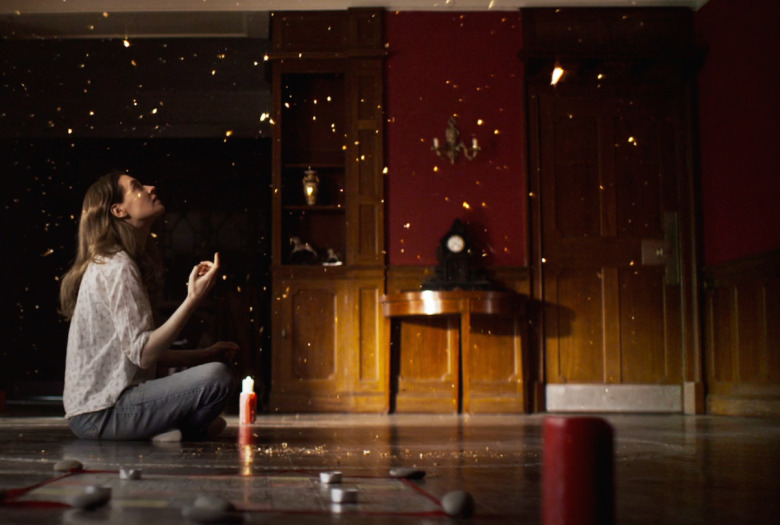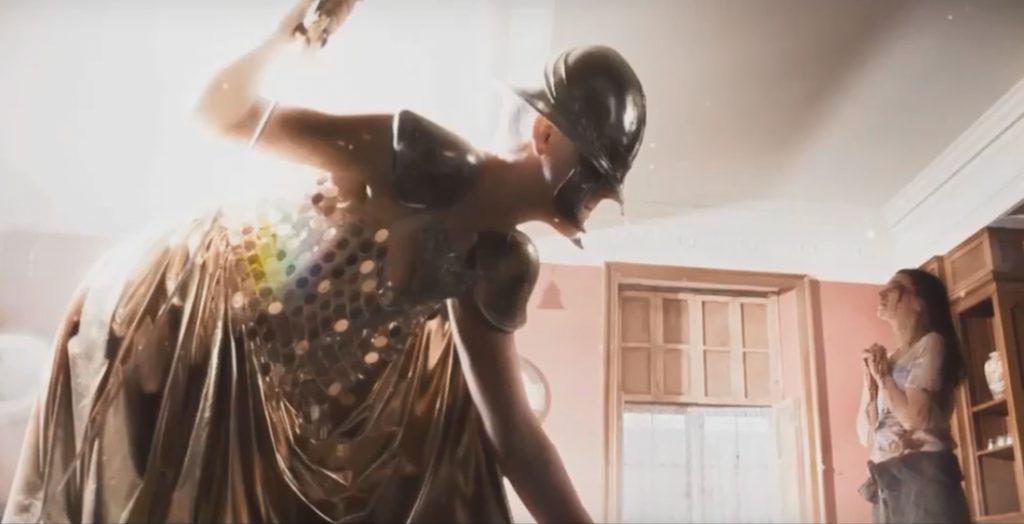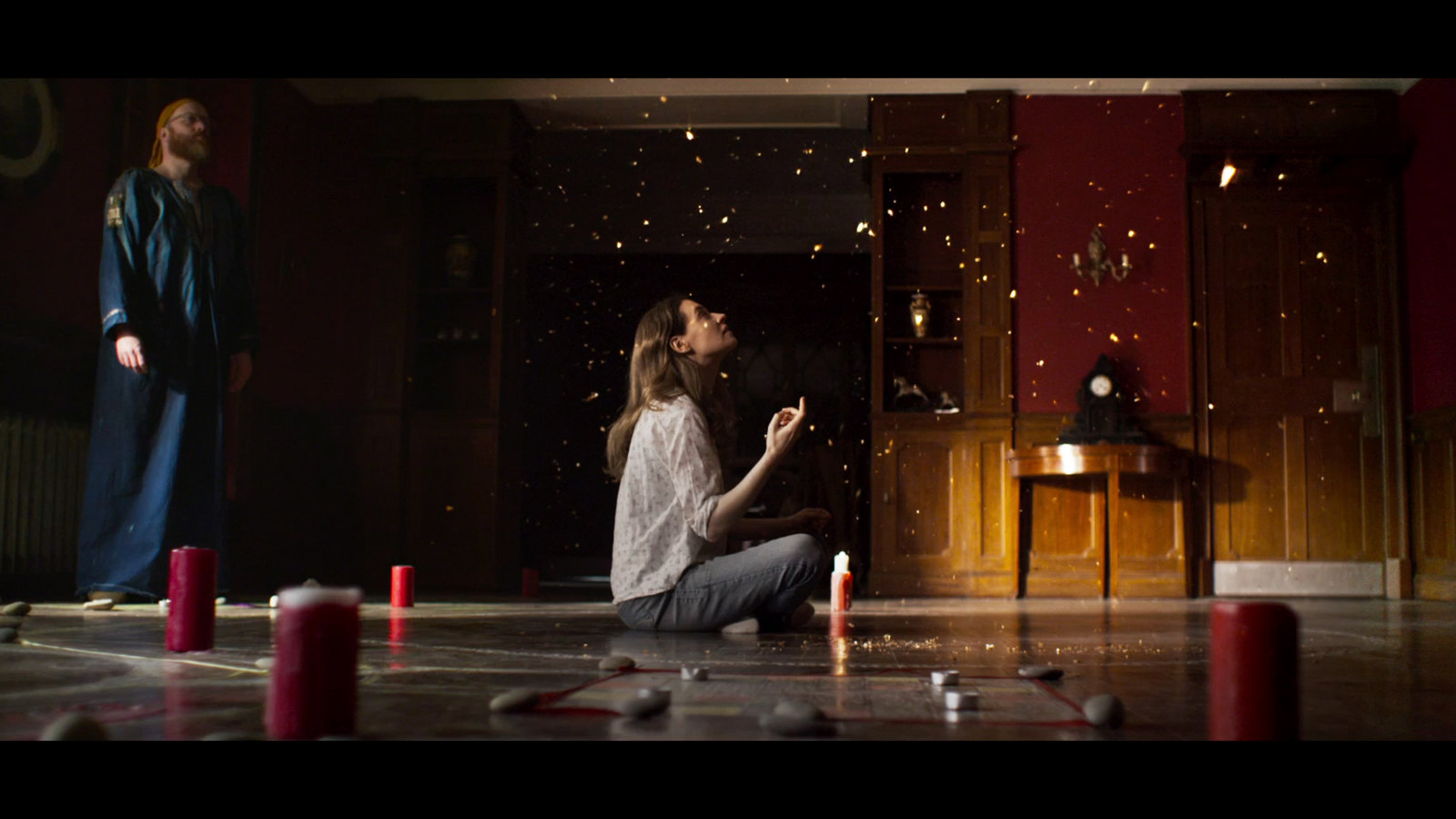Interview with A Dark Song Creator Liam Gavin. A couple years ago I stumbled upon a perfect little film – a closed box mindjob of an indie film – that I absolutely fell in love with. A Dark Song. It tells the story of a mom, so riddled with grief that she will do absolutely anything to make things right.
You can watch this great movie at any one of these links below:
And afterwards, you can read my walkthrough and theory explanations. But, I was just guessing! Today, we actually have the creator here, and we can ask him all our questions. So brilliant. Can’t wait to chat with the creator of this fantastic film.
Now – I will say this, there are some spoilers here – and I highly recommend that you watch the film before continuing forward. And yes, I’d like you to support Liam, so that he can go on and create more films. Lots more films. So go throw money at the guy. Copious, piles, of money.
A Dark Song Interview with Liam Gavin
THiNC. – “First, as a Christian, I come to this film with an interesting set of presumptions and ideas. Maybe you can share your vantage, and the assumptions under which you crafted this great film?”
Liam Gavin – “I’m going to put in a caveat right from the off that I’m believer that a work of art, once it is public, is no longer the possession of it’s creator. Whilst the original intention of the artist is obviously important and to be respected, the viewers opinions supersede it. It ultimately belongs to them. So that in mind, whilst ADS is clearly built around an occult ceremony, I wrote it as a Catholic film, specifically an Augustinian film. It’s about traveling, not away from but, into the deep flaws of a person and either being swallowed up by them or in the deep dark seeing a light and transcending them. I suppose somewhere deep down it’s a film about the luminous self struggling against the weight of their flaws, of original sin and redemption. Again the metaphysical structure is Christian rather than occult, it’s a Christianity that she’s deliberately fighting against (she’s an R.E. teacher). It’s also of a contemporary critique – once you stop being religious, religion doesn’t go anywhere, it just goes mad.”

THiNC. – “I personally see A Dark Song as almost an allegory or metaphorical lesson on anger, hatred, and loss. But also grace? How far off am I… am I wandering out in the woods?”
Liam Gavin – “A Dark Song at its core is about a woman’s anger at God. That’s the film I wrote. Also I imagined throughout that there was a God looking on throughout the proceedings, ‘powerless’ as this woman hurls herself towards the abyss, desperately waiting for just some little toehold to let His grace shine in. She has to go all the way into the blackness before she sees where she is clearly. Again, Augustine.”
THiNC. – “I will highly recommend readers to watch your film before reading through our chat in case of spoilers (also to get you more watches if at all possible!) Is Joseph Solomon a conman? He says he has done this before, and he speaks with confidence as he goes, but we also know that he was doing things for his own selfish gain.”
Liam Gavin – “Solomon is not a con-man. He is a legit occultist, I wanted to push the ambiguity at the beginning because how would you know if someone is an occultist or a charlatan? So I played on that. He’s someone from a deeply troubled background who’s found this thing and ran with it because it empowered him. For instance he genuinely does abuse alcohol to use the horrors as an altered state. But he also abuses alcohol. He lives life in a whirlwind causing immense destruction to those around him and himself. Magick and the Occult seems to be one of those things like surfing, golf, or skateboarding in that once people get into slightly it goes off and takes over their lives.”
THiNC. – “Can you talk about where the idea for the film came from? What inspired you to sit down and write this story?”
Liam Gavin – “I saw a documentary on Ch4 in the UK about Aleister Crowley and he performed this ritual in a house overlooking Loch Ness. He got bored half-way through and stormed off. He never sealed the ritual and it remains bonkers to this day. It burnt down recently. I’d spent a decade very nearly getting films funded and was looking for a one location film that I could do cheaply. Hey presto – a black magic ritual that even hardened magick practitioners balk at where you’re aiming to make manifest an angel. That’s pretty cool.”

THiNC. – “The ending. Sophia (which means wisdom… hrmmm) is actually, we learn, hellbent (literally) on revenge, she’ll do anything. But out of her work, and her desperation appears the guardian angel. Yes? Is that what was being summoned all along? Can you tell us about this change she discovers along the way?”
Liam Gavin – “The names of our two characters is where it all gets a bit occult in real life. It was one of those things, an actress I first had in mind when writing was called Sophia so I used that name (writers tip – when writing your script have actual actors cast in your head). Solomon’s name was Cassus for a long time but for reasons I can’t remember we had to change it at the very last second. I changed it randomly to Solomon but everyone thought that was rubbish (again, for reasons I can’t remember), but before I could change it it went out. He got called Solomon. So by accident we got Sophia the goddess of wisdom and Solomon the wise. The ending is a transformation of Sophia from one state of being to another, it is an a very real sense her redemption. She goes from dead set revenge, a complete rebellion against God, to seeing herself clearly in the blackness of the horror of where she’s ended up and what she’s become. She asks for forgiveness on the stairs as she is literally being dragged away to Hell and a chink is opened up for grace to pour in. The angel appears as a manifestation of this. She then instead of asking for revenge asks for the ability to forgive and thus to let go.”
Edited by: CY

